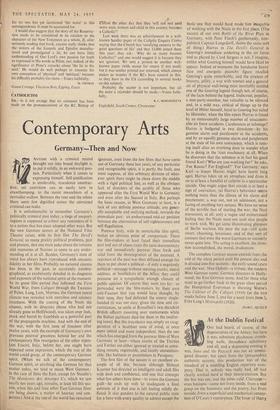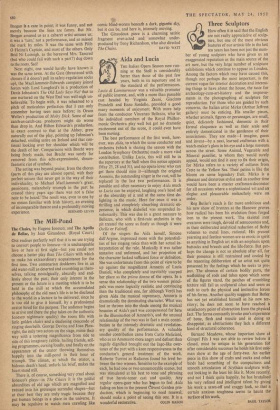At the Dublin Festival
ONE had heard, of course, of the degeneration of the Abbey; but here it was, substitute playhouse, crumb- ling walls, threadbare upholstery and all, and a depressing evening it was. Juno and the Paycoek was not an unmiti- gated disaster; but apart from the (presumably) authentic accents, this production was of the standard of a middling English repertory com- pany. That is, nobody was really bad, all had clearly worked hard at their interpretations. But the fire was out, and the ashes cold. Character— even business—came not from inside, from a real grasp on the humanity and the poetry,. but from outside, from a superficial and mechanical concep- tion of O'Casey's masterpiece. The Joxer of Harry Brogan Is a case in point; it was funny, and not merely because the lines are funny. But Mr. Brogan amused us as a cabaret artist amuses us; it was a 'turn,' not a performance, and so missed the mark by miles. It was the same with Pilib O Floinn's Captain, and most of the others. Only Brid Ni Loinsigh, as the bereaved Mrs. Tancred (but who could fail with such a part?) dug down to the roots. Sad !
Next night, one would hardly have known it was the same town. At the Gate (threatened with closure if it doesn't pull its safety-regulation socks up), the MacLiammoir-Edwards company joined forces with Lord Longford's in a production of Denis Johnston's The Old Lady Says Nol that to one nurtured on the West End was well-nigh un- believable. To begin with, it was rehearsed to a pitch of meticulous perfection that I can only remember having seen once before; in Orson Welles's production of Moby Dick. Some of our catch-as-catch-can producers might do worse than drop in. And Hilton Edwards's production, in exact contrast to that at the Abbey, grew naturally out of the play, pointing up Johnston's detached, smiling satire on Ireland and that con- tinual looking over her shoulder which will be the death of her. Comparisons with Brecht were being freely made, but Brecht was surely far removed from this echt-expressionist, dream- fantastic riot of symbols.
The acting was beyond praise; from the chorus (parts of this play are almost opera), with their perfect unison that never got in the way of their individuality, to Michael MacLiammoir's great, passionate, melancholy triumph in the part he created thirty years ago there was not a false note to be heard. The result was, even to one by no means familiar with Irish history, an evening of incomparable theatre and a profoundly moving































 Previous page
Previous page